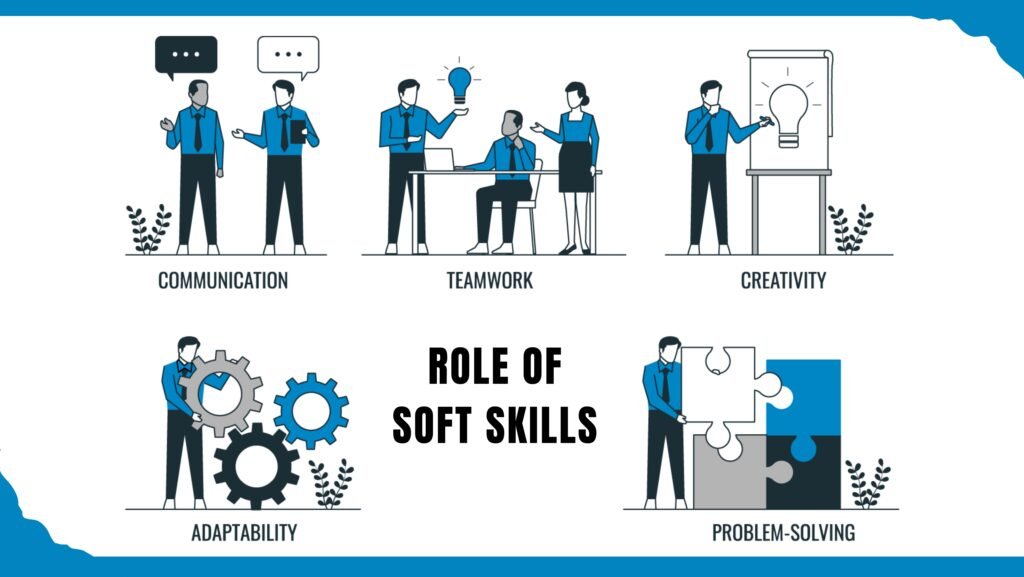Are you aspiring to get started on a career in technology? You’ve likely heard about the importance of mastering programming languages and technical tools. But here’s a secret that many tech professionals will share with you: Soft skills matter as much as technical skills. In this article, we will explore the significance of soft skills in the tech world, focusing on communication, teamwork, and problem-solving.
Why Soft Skills in Tech Matter
Communication, Breaking Down the Code
You’ve created a groundbreaking software solution, a marvel of code and algorithms. But how do you convey its value to your team, stakeholders, or clients? This is where communication skills come into play.
Being able to explain complex technical concepts in plain language is invaluable. Effective communication ensures that non-tech users understand and appreciate your technical brilliance, whether discussing project requirements, reporting bugs, or presenting your ideas.
Team Collaboration and Beyond
In the technology world, you rarely work in isolation. Most projects are collaborative efforts involving diverse teams. Your ability to work efficiently with designers, engineers, project managers, and other professionals is essential.
Teamwork isn’t just about coding; it’s about understanding each team member’s role, respecting their expertise, and collectively striving towards a common goal. Soft skills like empathy, adaptability, and active listening enhance your ability to be a valuable team player.
Problem-Solving, Debugging Life’s Challenges
IT professionals are, at their top, problem solvers. Whether fixing a bug in your code or tackling a broader project challenge, problem-solving is at the heart of what you do. However, problem-solving isn’t limited to code. Soft skills like critical thinking and creativity help you approach challenges with innovative solutions. They allow you to analyze issues, brainstorm ideas, and find efficient ways to overcome obstacles.
Soft Skills and Your Journey
As a student aspiring to enter the tech industry, focusing on developing soft skills alongside technical expertise is essential. Here’s why:
- Career Advancement: Soft skills set you apart. They’re often the deciding factor in promotions and leadership opportunities.
- Effective Collaboration: Strong, soft skills ensure you can work collaboratively with colleagues from various backgrounds to create a positive work environment.
- Client Satisfaction: In client-facing roles, your ability to communicate and understand their needs directly impacts client satisfaction and project success.
- Personal Growth: Soft skills enhance personal growth, improving overall quality of life and relationships.
Developing Soft Skills in Technology
Developing soft skills is an ongoing journey. Here are some strategies to get you started:
- Practice Communication: Engage in public speaking, writing, or teaching to enhance your communication skills.
- Join Teams: Participate in group projects, clubs, or open-source communities to refine your teamwork abilities.
- Embrace Challenges: Approach problems outside your comfort zone to strengthen your problem-solving skills.
- Seek Feedback: Request feedback from mentors, peers, and supervisors to identify areas for improvement.
Understanding the Varieties of Soft Skills
It’s crucial to recognize that soft skills encompass many attributes beyond communication, teamwork, and problem-solving. Let’s take a closer look at some other essential soft skills that can significantly impact your career as a technology worker:
Adaptability: The tech landscape is in a constant state of evolution. New programming languages, frameworks, and tools emerge regularly. Being adaptable and open to learning new technologies is a soft skill that will serve you well throughout your career.
Creativity: Innovation is at the heart of technology. Creativity is vital in developing a new app, improving the user experience, or solving complex coding challenges. It allows you to think outside the box and develop unique solutions.
Time Management: Effective time management is very important in the fast-paced world of technology. Meeting project deadlines, prioritizing tasks, and balancing multiple responsibilities require strong organizational and time management skills.
Conflict Resolution: Like any field, technology can be subject to conflicts and disagreements. Soft skills such as conflict resolution and diplomacy are invaluable for maintaining a positive work environment and resolving problems constructively.
Leadership: As you progress in your career, leadership skills become increasingly important. Leading a team, project, or initiative requires inspiring, motivating, and guiding others toward a common goal.
The Balance Between Hard and Soft Skills
While soft skills are certain to be important, they are most effective when paired with technical skills. The synergy between hard and soft skills can elevate your career.
Here’s how they complement each other:
Technical Proficiency Enhances Confidence: A strong grasp of technical concepts and tools boosts confidence. When you know you can tackle complex problems, it becomes easier to communicate your ideas and collaborate effectively.
Soft Skills Improve Team Effort: Technical skills might get the work done, but soft skills make teamwork work. The ability to communicate, empathize with colleagues, and mediate conflicts fosters a positive team environment.
Future-Proofing Your Tech Career with Soft Skills
The tech industry is known for its rapid changes, making it essential to future-proof your career. Soft skills provide a sturdy foundation for adapting to the evolving tech landscape.
Here’s how they help you stay ahead:
Tech Trends Come and Go, Soft Skills Persist: While programming languages and tools may become outdated, soft skills remain relevant across technological shifts. The ability to communicate, collaborate, and innovate will always be in demand.
Career Agility: You may transition between tech roles or industries in a fast-paced industry. Soft skills like adaptability and communication make these transitions smoother, ensuring your skills remain valuable.
Conclusion
In the tech world, the most successful professionals possess a balanced toolkit, including technical and soft skills. As a student aiming to build a career in the tech industry, remember that soft skills like communication, teamwork, and problem-solving are the bridges that connect your technical brilliance to the world. Nurture these skills, and you’ll excel in your career, find fulfillment, and make a meaningful impact through technology.
So, as you step into the fascinating world of technology, equip yourself with the invaluable soft skills that will set you on the path to success. Happy coding, collaborating, and problem-solving on your tech journey!







